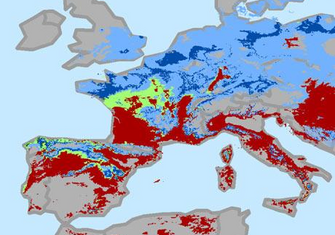With speculation linking recent bad weather in the UK to climate change, Vin-X takes a look at how this could affect the wine market in the future.
Two weeks ago, I had the interesting experience of nearly driving my car into a river. The river was flowing across a local A road in Surrey at the time – you may have seen the pictures on the news – but needless to say I was rather surprised. Consulting some of my neighbours, I was told that such an event had not occurred in recent memory, and that the river had never even burst its banks, much less flooded local roads and homes.
It is now nearly impossible to deny that climate change is a real and serious issue: 97% of scientific papers taking any view on climate change between 1991 and 2011 agreed that climate change is real, and that is being caused being humans. The implications of this for the wine industry are clear: weather is already absolutely crucial when producing wines, and even seasonal variations can cause huge differences in quality, as seen last year during the 2013 growing season in Bordeaux. Indeed, should some predictions prove true, some of the most prestigious and historical wine-producing regions of the world may not be able to produce wine at all, as shown by the map below.
Even a cursory look at the map above shows that Bordeaux, the Rhône Valley, Tuscany, and large parts of Spain may no longer be suitable for wine production by 2050. Conversely, we can also see that new regions will open up as possible locations for vineyards: the Netherlands, Belgium, Germany, and even southerly parts of countries like the UK and Denmark could benefit from predicted changes in climate.
Of course, as with any predictions of this nature we must take the data with a small pinch of salt, as the coming changes are all theoretical: It may be the case that these changes would take much longer, and the assertion that it will no longer be possible to grow wine in Bordeaux in 35 years seems like a very bold prediction, to say the least . However, if Bordeaux were to become no longer suitable for wine production, any wines produced in this region which are still drinkable in 2050 (which would include the vast majority of investment grade wines purchased now) will become genuine relics of a bygone age. Having such an anachronistic marvel in one’s portfolio would be a real coup for any investor in the years to come.

